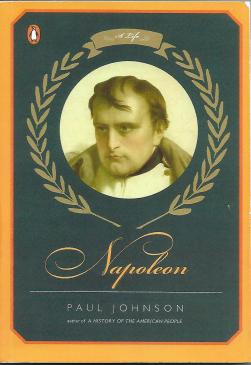Napoleon ~ A Capsule Book Review by Allen Kopp
Napoleon Bonaparte was born on the tiny island of Corsica in 1769 to a minor aristocratic family. Corsica is closer to Italy but was a French possession, so Napoleon was born a French citizen and will forever be identified as French, although he didn’t have high regard for France. As he grew into adulthood (he was only five feet, five inches tall), he became interested in all things military. At a young age he became a military man and was found to have an uncanny instinct for military strategy. He rose through the ranks and soon was in command of a mighty military force.
Napoleon filled the leadership vacuum left by the French Revolution and can be said to have ended the Revolution. When France was struggling to find a foothold after years of turmoil, he stepped in and filled the void, declaring himself Emperor. His ego and ambition knew no bounds. His goal was to conquer all of Europe, from Spain in the west to Russia in the east. His military venturing even led him to Egypt and North Africa. He saw himself as a conqueror in the mold of Alexander the Great and Julius Caesar.
He engaged in almost constant war. Hundreds of thousands of people lost their lives in Napoleonic wars, not to mention the vast sums of money spent to finance the war machine. People began to consider him an opportunistic lunatic who would sacrifice anything or anybody on earth to satisfy his ambitious goals. He was a man without sentiment, loyalty or religion. He had nothing to hold him back.
Of course, he was not without his shortcomings. (Every tyrant, dictator or despot has his downfall built in.) He was impatient, impulsive, lacking in subtlety, refinement or social graces, incapable of deliberative thought or action. Though a master military strategist, he was not a politician and knew nothing of tact and diplomacy. He was all about force, taking the enemy by surprise and gaining the upper hand through superior strategy and cunning. When he sold what became known as the “Louisiana Purchase” to the United States (an enormous area that became thirteen states) for fifteen million dollars (about four cents an acre) to continue to finance his war machine, it was seen (in retrospect) as one of his biggest blunders. He might have extended his empire to the North American continent but wasn’t visionary enough to do so.
His disastrous military campaigns in Spain and Russia—with staggering loss of life and destruction of property—signaled his end. People were sick and tired of almost constant warfare and chaos. Even his most ardent admirers were beginning to turn against him. He was forced to abdicate his title of emperor—leading to a restoration of the monarchy—and was exiled to the tiny island of Elba, seven miles off the coast of Italy. He was not to be contained, however; he was still burning with desire and ambition. He was bored and wasn’t given as much money as he thought he needed. He returned to France, where he once again established himself as emperor and marshaled a huge army.
He met in battle the Duke of Wellington, an Anglo-Irish soldier and statesman, at a place called Waterloo in present-day Belgium. After a bloody and horrific battle, he was defeated. This was to be his final battle and his final defeat. The Napoleonic age was at an end.
Napoleon Bonaparte was this time exiled to the tiny island of Saint Helena, located in the South Atlantic. While not exactly a prisoner or under house arrest, he was closely guarded and would not again be allowed to return to France of his own volition. As long as he was alive, he was viewed as a threat, especially since he still had many admirers and adherents all over the world who would have gladly helped him to escape. He was kept on the island for about six years until he died at the age of fifty-one in 1821.
Napoleon by English historian Paul Johnson is a concise (187 pages) overview of Napoleon’s life and times. While it’s a historical biography, it’s also a fascinating story. A small, pale, young man from humble beginnings becomes the leader of the army of a great nation and, after declaring himself Emperor of that nation, sets out to conquer an entire continent. Truth is stranger than fiction.
Copyright © 2017 by Allen Kopp

